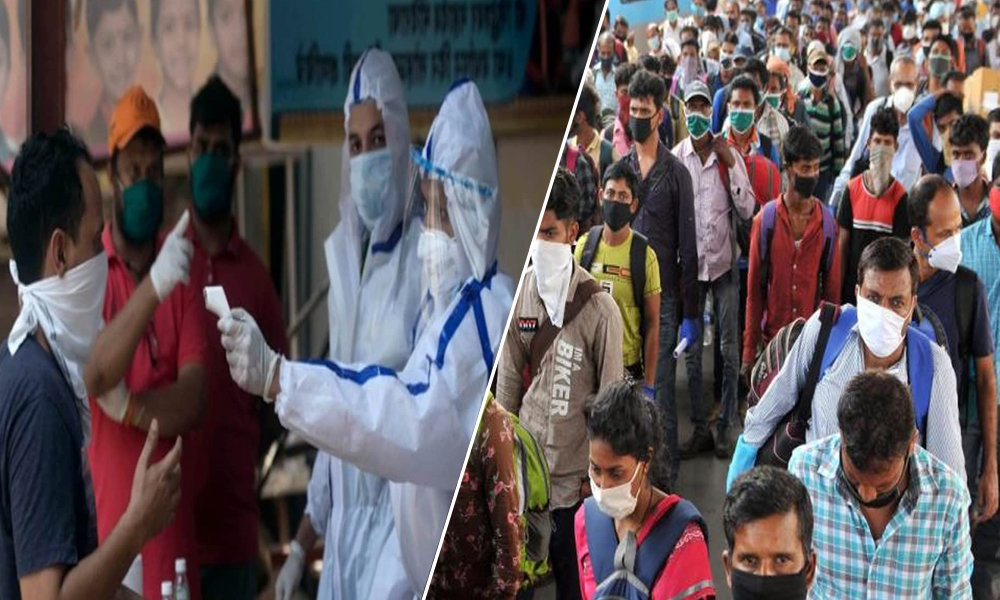
Credits: NewIndianExpress
From Lack Of Beds To Poor Contact Tracing, House Panel Assesses Govt's Response To Pandemic
Writer: Devyani Madaik
A media enthusiast, Devyani believes in learning on the job and there is nothing off limits when it comes to work. Writing is her passion and she is always ready for a debate as well.
India, 22 Nov 2020 8:52 AM GMT | Updated 22 Nov 2020 10:39 AM GMT
Editor : Rakshitha R |
Rakshitha an engineer turned passionate journalist with an inclination for poetry, creative writing, movies, fiction, mountains and seclusion. Not a part of the social process but existential.
Creatives : Abhishek M
" An engineer by profession, Abhishek is the creative producer of the team, graphic designing is his passion and travelling his get away. In more ways than one, he makes the content visually appealing."
It is for the first time in the parliamentary history that the standing committee reports were presented virtually. Besides, the report is among the first official assessments of the fallout of the pandemic.
In its assessment on the government's response to the coronavirus outbreak, the Parliamentary Standing Committee on Health and Family Welfare flagged several areas of concerns and identified gaps in the implementation of the contingent plan.
The Committee, chaired by Samajwadi Party Rajya Sabha MP Ram Gopal Yadav, virtually presented four reports to Rajya Sabha Chairman M Venkaiah Naidu.
It is for the first time in the parliamentary history that the standing committee reports were presented virtually. Besides, the report is among the first official assessments of the fallout of the pandemic.
In its report titled 'The Outbreak of Pandemic COVID-19 and Its Management', the panel looked at every area of concern including Government's handling of the crisis, including hospitals, slow testing, poor contact tracing, the cost of treatment, surveillance, issues faced by frontline workers, school-going children, women, and mental health. Besides, it laid down some recommendations for the government, reported The Indian Express.
Treatment Costs Pushing Families To Poverty
The Committee observed that excess spending on health, due to the unforeseen circumstances may have pushed many families below the poverty line. The panel said that a sustainable pricing model for treating COVID patients could have 'averted many deaths'. It stressed on the need for better partnership between the Government and private hospitals, and come up with an affordable pricing model.
Besides, the panel also raised concern over misleading advertisements of products that were approved by the Ministry of AYUSH as immunity boosters and asked the Ministry to monitor such ads.
Lack Of Beds
The panel noted that the government hospitals had an inadequate number of beds and not keeping up with the rising number of cases. Due to this, multiple incidents of patients being turned away due to lack of vacant beds were reported.
The panel also asked the Union Health Ministry to submit a note explaining why the Delhi government reserved only a few beds in hospitals for COVID patients during the early days of the pandemic.
In Delhi's Ram Manohar Lohia hospital, out of the 1,572 beds, only 242 beds were dedicated COVID beds, and in Safdarjung Hospital, out of 2,873 beds, only 289 were reserved for coronavirus patients. The panel also flagged low utilization of railway coaches that were converted into COVID-care centres, while people struggled to find beds in hospitals.
The panel recommended the Centre to invest more in public health and take appropriate steps to decentralize the healthcare services/facilities in the country.
Testing
The panel highlighted the country's reliance on questionable tests that left high rates of false-negative tests. In India, most of the results come from quick antigen tests which are less accurate than RT-PCR tests.
The Committee asked the Government to assess the veracity of Rapid Antigen Test in-relation to RT-PCR and other diagnostic tests to get the real picture of the testing capacity in the country, and recommended that testing facilities be ramped up for more accurate tests.
The panel also underlined a lack of testing facilities in rural areas, that has resulted in underreporting of cases. The Primary Health Centres and Community Health Centres are still mostly devoid of any testing facilities and the required technical workforce, it noted and asked for a strong network of Viral Research & Diagnostic Laboratories (VRDLs) be set up in those areas.
Poor Contact Tracing
The Committee took a note of poor contact tracing and slow testing in the initial phase of the outbreak, that led to the increase in the number of infections. The panel said it was 'constrained to observe the failure of the National Centre for Disease Control-Integrated Disease Surveillance Programme (NCDC-IDSP) in generating the required response'.
"The Committee feels that NCDP-IDSP should have been utilized more effectively especially when the sole objective of IDSP is to detect and respond to outbreaks in the early rising phase through trained Rapid Response Teams (RRTs)," the media reported.
The Committee said that there is an urgent need to assess the financial requirement for NCDP-IDSP for its revitalization.
Frontline Workers
The Committee has apprehended the rising number of instances of mistreatment of healthcare workers, especially ASHA workers, along with the delay and denial of their salaries. The panel said that it is 'pained to note that community health workers were denied wages even though they are the foot soldiers of the healthcare system.'
Women
The outbreak severely impacted the delivery of healthcare services after non-COVID services were put on hold/shut down during the lockdown, of which women bore the maximum brunt, especially sexual and reproductive healthcare services, the Committee said.
"Access to contraceptives or healthcare services became difficult, which led to many unwanted pregnancies and unsafe abortions. The Committee, therefore, strongly recommends the Government to chalk out a specific course of action for rescuing the women out of mental trauma by resuming the sexual and reproductive healthcare services and allocating the resources to improve women health services," the document as quoted.
Besides, restrictive social norms, gender stereotypes, diversion of resources and home quarantine to respond to the COVID-19 pandemic could also contribute to limiting women's ability to access health services, the panel added. Sexual and domestic violence during the lockdown period was also alarming, as the perpetrators of violence and susceptible both stayed at home, it noted.
The Committee asked the Ministry to create helpline numbers, telemedicine services, rape crisis centres for women.
Shut Down Of Schools
The Parliamentary Committee raised concern over the impact of a prolonged closure of schools on children, especially those belonging from the weaker section of the society. It became more prevalent due to the shift in education method from the classroom to the online platform, which only some children could afford, while the rest either were struggling with low connectivity or unfortunately dropped out.
The panel recommended the Government to strengthen its network for digital and online classes and provide extra special classes for such students, once the regular classes resume.
Mental Health
COVID has triggered a massive rise in mental health cases. This included uncertainty about future, losses in business, lay-offs, risk of contracting infection, the uncertainty of life returning to normalcy, concerns about loss of family and loved ones, pre-existing mental illness (depression, anxiety, insomnia).
The Committee specifically highlighted the 'increased risk of suicide due to this and asked the Centre to prioritize suicide prevention and mental health issues.
The panel also appreciated Centre's various measures to curb the initial surge in COVID cases, including 'Janta Curfew'. However, it asked the Centre to address the glaring lapses mentioned in the document on a priority basis.
Also Read: Two Years After Major's Death, His Wife Completes Training, Set To Join Indian Army
 All section
All section














